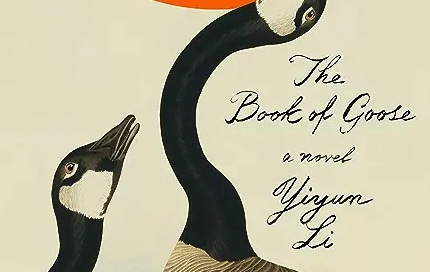BookLife Review: The Book of Goose, by Yiyun Li
Childhood friendships, girlhood, coming of age, storytelling, boarding school, Paris, London, French countryside, class, education
At its essence, The Book of Goose by Yiyun Li, is a poignant story of a precious but volatile girlhood friendship that cannot survive into young adulthood. It also a tale of the transformative power of imagination.
Set in postwar France, The Book of Goose lays bare the imbalance and instability of the intimate friendship between Fabienne and Agnes. Fabienne is motherless—a shepherd who lives with her father and brother in striking poverty. Fabienne stopped attending school to tend the family’s farm animals after her mother died. Agnes, the youngest child of another poor but slightly better off; she has an intact family and attends school. Agnes’ older brother is a terminally ill veteran of the war and his decline draws the full focus of her parents and older married siblings, largely neglecting Agnes and leaving her to her own devices. Agnes devotes all of her free time and emotional energy to Fabienne after school.
Fabienne is possessed of a vivid imagination and hatches a plan to write a book of dark tales of the gruesome realities and hardships of farm and country life. She narrates the stories to Agnes, who contributes small bits, and they enlist the local widowed postmaster to help shape the stories. Fabienne declines to be named as co-author, and assigns Agnes to be the sole author of the stories. With the help of the widowed local postmaster, the stories are published and Agnes is heralded as a child prodigy. The postmaster has improper designs on young Fabienne and the girls concoct a plan to have him exposed and effectively banished from town.
Agnes travels to Paris for the books’ publication and press, and eagerly returns to share the experience with Fabienne. The two friends create a second book and in the interim, a London boarding school matron seizes on the popularity of the book, scoops up Agnes to attend her “finishing school” in London, and garners significant publicity for her school in the process. Fancying herself as a writer, the headmistress angles to become Agnes’ new mentor and editor. Agnes slowly awakens to the self-interest of the adults purportedly guarding her interests and the fleeting nature of her future as a novelist without Fabienne.
The novelty of her “educational opportunity” and success wears thin and Agnes schemes to return home to her friend Fabienne. She dreams of escaping their village and building a life with Fabienne in the city, despite their youth and lack of means. The depth of Agnes’ attachment to Fabienne is not reciprocated. Either Fabienne either is wise beyond her years and portends that the twosome cannot have the future Agnes imagines, or she knows that Agnes’ education and experience foretell a life without a role for her in it. They are not geese; they are not mated for life. Fabienne fosters distance between the two friends, and the bond begins to deteriorate.
Author Yiyun Li captures the emotional intensity and pain of childhood friendships. There is a passion and single-mindedness to some childhood bonds that cannot be matched in adulthood. In The Book of Goose, the poverty and emotional barrenness of their family lives enhance the splendor of the girls’ bond, but it is one that cannot survive the intrusion of the realities of adult life where their disparate educations create an abyss. The path the story takes is inevitable and tragic, but it is an experience that echoes with every adult who shared secrets and built imaginary worlds with a treasured childhood friend.




